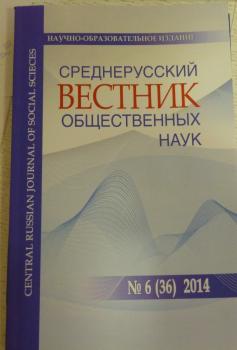Lipeck, Lipetsk, Russian Federation
In the article some questions of a role of assessment of regulating impact on regulatory legal acts as a new instrument of public administration in forming of the public income of the state are considered. Assessment of regulatory impact in foreign countries has established itself as the ideal procedure for interaction between government and business on optimizing business, risk-sharing between the actors on the social and economic problems, finding alternative, transparent ways of formation of the legislation and its implementation in the field of entrepreneurship. Distribution of regulatory impact assessment in the Russian Federation took place relatively quickly and successfully. The nucleus of leaders of the Russian Federation is formed which has held the first position for five years in the implementation of this procedure and favorable investment climate has been created in the region. But despite the positive process of promoting regulatory impact assessment, there are some problems to be solved. Such as, the quality of regulatory impact assessment materials, correctness and completeness of the compilation of the regulatory impact assessment findings, certain routine approach to the implementation of this procedure in the Russian Federation. Therefore, in this article contemporary issues of implementation of regulatory impact assessment (RIA) are examined as well as the positive features of the regulatory impact assessment, both for the state and society.
regulatory impact assessment, budget income, problems of implementation of regulatory procedures, entrepreneurial activity, state regulation tools, assessment of regulating impact, budget, sales problems of the regulating procedure
1. Belyaev A.N., Derman D.O., Tsygankov D.B. Metodicheskie podkhody k meta-otsenivaniyu kachestva zaklyucheniy ob otsenke reguliruyushchego vozdeystviya. Proektirovanie, monitoring i otsenka. - 2011. - № 1. - URL: http:// www.pmojournal.ru
2. Golodnikova A.G., Tsygankov D.B. «Targetirovanie» otsenki reguliruyushchego vozdeystviya: mezhdunarodnye podkhody i rossiyskaya praktika. Voprosy gosudarstvennogo i munitsipal´nogo upravleniya. 2015. -№ 4. -S. 7−40.
3. Zenzinov G.A. Ob otsenke reguliruyushchego vozdeystviya v Kostromskoy oblasti. Vestnik KGU im. N.A. Nekrasova. 2015. -№ 2. -S. 189−194.
4. ORV v tsifrakh. - URL: http:. www. orv.gov.ru.
5. Monitoring provedeniya ORV proektov normativnykh pravovykh aktov Lipetskoy oblasti za 9 mesyatsev 2016 goda. - URL: www. admlip.ru/activities / otsenka-reguliruyushchego-vozdeystviya/monitoring-orv/
6. Kolegov V.V. Otsenka reguliruyushchego vozdeystviya: opyt vnedreniya na regional´nom urovne. Gosudarstvennoe upravlenie. Elektronnyy vestnik. 2013. № 39. S. 95−112. - URL: http://ejournal.spa.msu.ru/vestnik/item/39_2013kolegov.htm (data obrashcheniya: 2.04.2016).
7. Kruglova E.V., Svetun´kov M.G., Shelaganova I.V. Otsenka reguliruyushchego vozdeystviya kak mekhanizm poiska balansa mezhdu ekonomicheskoy i sotsial´noy effektivnost´yu (na primere gosudarstvennogo regulirovaniya rynka alkogol´noy produktsii v Ul´yanovskoy oblasti)// Sovremennaya konkurentsiya. 2014. - № 43. - S. 71−79. URL: http://www.moderncompetition.ru/ r/articles/article/index.php?article_id_4=1601 (data obrashcheniya: 4.04.2016).
8. Kul´kova V.Yu. Formirovanie nalogovogo mekhanizma ustoychivogo razvitiya regiona (na primere Respubliki Tatarstan). diss... kand. ekon. nauk. Kazan´, 2001.
9. Kul´kova V.Yu. Analiz sostoyaniya byudzhetov munitsipal´nykh obrazovaniy v Respublike Tatarstan v usloviyakh munitsipal´noy reformy i razgranicheniya dokhodnykh i raskhodnykh polnomochiy //Regional´naya ekonomika: teoriya i praktika. 2008. - № 1. - S. 47- 57.
10. Christopher D. Can the administrative state be tamed?. Journal of Legal Analysis. Spring 2016: Volume 8, Number 1. P. 142-146.





